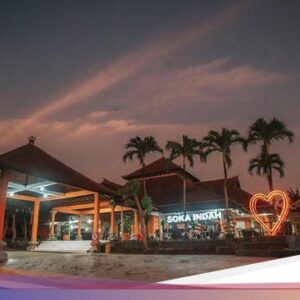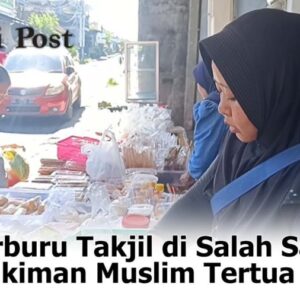Klungkung –
Warung Laklak Pengangon, in Bakas Village, Banjarangkan District, Klungkung, Bali, is a popular stopover for tourists heading to Bangli or Besakih Temple, Karangasem. Visitors who come are not only tourists, but also local residents who want to relax while enjoying traditional snacks.
The location of Warung Laklak Pengangon is on the side of the main road in Bakas Village. This stall is open every day from 10.00 WITA to 20.00 WITA.
Warung Laklak Pengangon is famous for its typical Balinese snack, laklak, which is served with a typical Bakas taste. The laklak here is cooked traditionally using a wood-burning stove, giving it an authentic sensation that makes many visitors curious.
ADVERTISEMENT
SCROLL TO CONTINUE WITH CONTENT
Visitors can enjoy one portion of laklak for just IDR 5 thousand. Laklak is served with fresh grated coconut and melted palm sugar which is sweet and tempting.
Kadek Sriani, a seller at Warung Laklak Pengangon, ensures that all ingredients are always fresh. Rice flour, the main ingredient for making laklak, is processed in-house to maintain its distinctive taste. This stall can consume 3 to 4 kilograms (kg) of rice flour every day.
“Eating laklak is incomplete without drinking it. We also provide coffee with various international brands, but still at shop prices,” said Sriani.
Apart from laklak, Warung Laklak Pengangon also offers other traditional snacks, such as banana rai and black sticky rice. These traditional snacks can also be combined according to taste and the price is still IDR 5 thousand per portion.
This stall also provides a menu of nasi sela (cassava) with traditional side dishes typical of Bakas Village consisting of shish chicken, anointed vegetables and long beans, for IDR 10 thousand per portion. The combination of affordable prices and filling portions makes this stall always busy.
The owner of Warung Laklak Pengangon, I Wayan Malendra, explained that the name ‘pengangon’ comes from the activities of local residents who work as farmers and herders. Malendra opened this shop during the eruption of Mount Agung which had an impact on Bali’s economy.
“The impact of the eruption became a lesson for me to open a business while continuing to farm,” said Malendra.
Warung Laklak Pengangon was originally created to provide coffee and laklak for resting farmers. After tourism recovered, Malendra developed his stall into educative tourism by introducing traditional Balinese culinary and agricultural culture to tourists.
Apart from enjoying laklak, visitors can also feel the surrounding natural atmosphere and learn more about local culture.
“With the support of customers who often share their experiences on social media, Warung Kopi Laklak Pengangon is becoming more widely known,” added Malendra.
(hsa/hsa)






